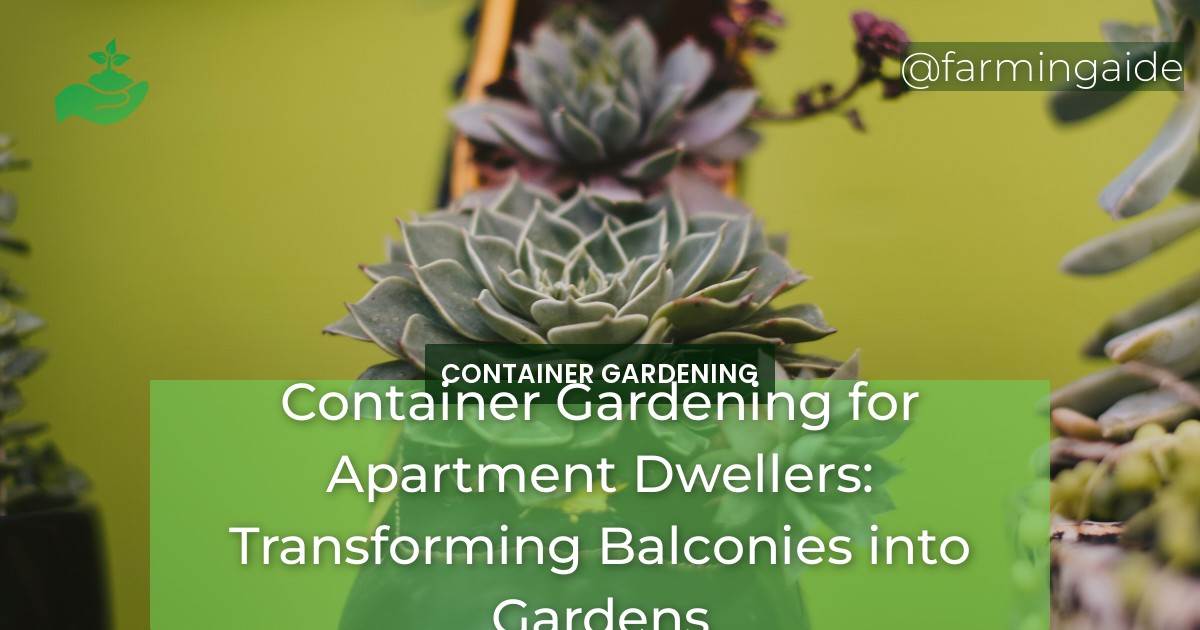Container gardening is growing in popularity, and apartment dwellers are at the forefront. With balcony space often limited, it’s the perfect way to enjoy nature and make use of constrained areas. If you’re an urban dweller, there’s no better way than container gardening for apartments to give your balcony an instant transformation. Container gardening is a great way to make your small space come alive with colors, fragrances, and the joy of watching your plants grow. It doesn’t matter if your balcony is small or large, a few potted plants can instantly brighten up any space.
In this article, we’ll look at why container gardening for apartments is the perfect choice for apartment dwellers, and how you can get started easily and quickly. Find out the best plants for small balconies, as well as tips and tricks on creating an attractive and vibrant container garden for your own balcony.
Benefits of Container Gardening for Apartments
When you live in an apartment, having a traditional garden is not always an option. However, this does not mean that you cannot enjoy fresh produce and beautiful flowers. Container gardening is an excellent alternative for apartment dwellers who want to bring the outdoors inside. Here are some benefits of container gardening for urban dwellers.
Table of Contents
Enhancing Outdoor Living Spaces
One of the biggest advantages of container gardening is that it allows you to transform your balcony into a beautiful garden. This will not only beautify your outdoor living space but also provide a relaxing and peaceful environment.
Health Benefits of Container Gardening
Container gardening is not only good for your mental health, but it is also an excellent way to improve your physical health. Studies have shown that gardening can reduce stress levels, lower blood pressure, and promote healthy eating habits.
Cost-Effective Option for Gardening
Container gardening is a cost-effective option for gardening. You do not need a lot of space to get started, and you can use a variety of containers to grow plants. This means that you can save money on gardening supplies and still enjoy the benefits of fresh produce and beautiful flowers.
Choosing the Right Containers for Your Plants
Before you start container gardening, it is essential to choose the right containers for your plants. Here are some factors to consider when choosing containers.
Factors to Consider When Choosing Containers
When choosing containers, you should consider the size of the plant, the root system, and the amount of sunlight it needs. You should also consider the type of soil you will use and how often you will need to water the plant.
Types of Containers for Container Gardening
There are many types of containers for container gardening, including plastic, ceramic, clay, and metal. You should choose a container that is durable, lightweight, and has good drainage.
Best Plants for Different Containers
Different plants require different types of containers. For example, herbs can be grown in small pots, while tomato plants require large containers. Consult with a gardening expert or research online to learn which plants are best suited for your container.
ALSO READ
Designing Your Container Garden
Designing your container garden is an essential part of the process. Here are some tips to help you get started.
Creating a Layout for Your Garden
Before you start planting, you should create a layout for your garden. Consider the amount of space you have available and choose a layout that maximizes your space.
Choosing Plants for Your Garden
Choose plants that thrive in containers and are also suited for your environment. For example, if you have a balcony that receives a lot of sunlight, choose plants that require full sun.
Adding Decorative Elements for Visual Interest
Add decorative elements such as colorful pots, trellises, and garden statues to add visual interest to your garden.
Maintaining Your Container Garden
Maintaining your container garden is essential to ensure that your plants grow healthy and strong. Here are some tips to help you maintain your container garden.
Watering and Fertilizing Your Plants
Make sure to water your plants regularly and fertilize them as needed. Use a high-quality fertilizer that is specifically designed for container plants.
Managing Pests and Diseases
Keep an eye out for pests and diseases that can damage your plants. Use organic pest control methods if possible or consult with a gardening expert for advice.
Pruning and Trimming Your Plants
Prune and trim your plants regularly to keep them healthy and to promote growth.
ALSO READ
Maximizing Space in Your Container Garden
Maximizing space in your container garden is essential, especially if you have limited outdoor space. Here are some tips to help you maximize your space.
Vertical Gardening Techniques
Use vertical gardening techniques such as trellises and hanging baskets to grow plants vertically.
Companion Planting Strategies
Companion planting is a strategy that involves planting different plants together to benefit each other. For example, planting herbs with vegetables can help repel pests.
Creative Container Placement Ideas
Think outside of the box when it comes to container placement. Use old furniture, such as dressers or bookshelves, to create unique and beautiful container gardens.
How Can I Transform My Balcony into a Herb Container Garden?
Transforming your balcony into a lush oasis with growing herb container gardens is easier than you think. Start by selecting the right containers and herbs that thrive in your climate. Ensure proper drainage and sunlight, and don’t forget to water and fertilize regularly. Enjoy the satisfaction of fresh herbs at your fingertips.
Conclusion
Container gardening is an excellent option for apartment dwellers who want to enjoy fresh produce and beautiful flowers. With the right containers, plants, and design, you can transform your balcony into a beautiful garden. Remember to choose the right containers, design your garden well, maintain your plants, and maximize your space, and you will have a thriving container garden in no time.
RELATED ARTICLES:


